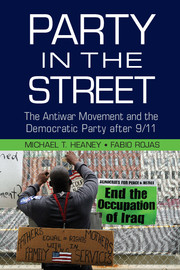Book contents
- Frontmatter
- Dedication
- Contents
- List of Tables
- List of Figures
- List of Abbreviations
- Introduction
- 1 The Party in the Street and Its Historical Context
- 2 Partisan Politics at the Water's Edge?
- 3 Multiple Identities and Party-Movement Interaction
- 4 Identities and Grassroots Participation
- 5 Identities and Organizational Action
- 6 Identities and Legislative Agendas
- 7 Beyond the Antiwar Movement and the Democratic Party
- 8 Social Movements in a Polarized America
- Epilogue
- Appendixes
- References
- Index
3 - Multiple Identities and Party-Movement Interaction
Published online by Cambridge University Press: 05 February 2015
- Frontmatter
- Dedication
- Contents
- List of Tables
- List of Figures
- List of Abbreviations
- Introduction
- 1 The Party in the Street and Its Historical Context
- 2 Partisan Politics at the Water's Edge?
- 3 Multiple Identities and Party-Movement Interaction
- 4 Identities and Grassroots Participation
- 5 Identities and Organizational Action
- 6 Identities and Legislative Agendas
- 7 Beyond the Antiwar Movement and the Democratic Party
- 8 Social Movements in a Polarized America
- Epilogue
- Appendixes
- References
- Index
Summary
I … know that Saddam [Hussein] poses no imminent and direct threat to the United States or to his neighbors, that the Iraqi economy is in shambles, that the Iraqi military is a fraction of its former strength, and that in concert with the international community he can be contained until, in the way of all petty dictators, he falls away into the dustbin of history. I know that even a successful war against Iraq will require a U.S. occupation of undetermined length, at undetermined cost, with undetermined consequences. I know that an invasion of Iraq without a clear rationale and without strong international support will only fan the flames of the Middle East, and encourage the worst, rather than best, impulses of the Arab world, and strengthen the recruitment arm of al-Qaida. I am not opposed to all wars. I'm opposed to dumb wars.
Barack Obama, October 2, 2002 (National Public Radio 2009)The peace rally at Chicago's Daley Plaza on October 2, 2002, was among the first of a new wave of antiwar demonstrations against the Bush administration's plans for Iraq. According to an article appearing in the Chicago Tribune, approximately one thousand people attended the rally, which was organized by a newly formed coalition, Chicagoans against War in Iraq (Glauber 2002). The same Tribune article neglected to mention that among the speakers at the event was Barack Obama, an African-American state senator from the thirteenth district of Illinois, pictured in Figure 3.1.
- Type
- Chapter
- Information
- Party in the StreetThe Antiwar Movement and the Democratic Party after 9/11, pp. 71 - 93Publisher: Cambridge University PressPrint publication year: 2015

